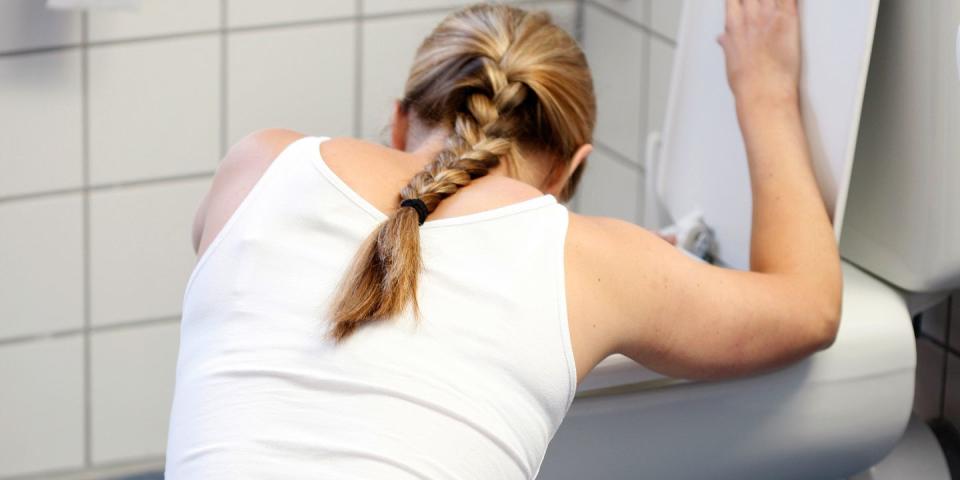Why you've got more chance of catching norovirus this year than last year

'Tis the season to get sick. If you're lucky, you might get away with a light cold. If you're less fortunate, you'll be dealt a hand of the flu/tonsilitis/norovirus.
And norovirus is proving its worth as 'the winter vomiting bug' - the name by which it's also known - after statistics from Public Health England (PHE) indicate that the number of outbreaks recorded in England and Wales this year is higher than the number of outbreaks in the same period last year.
The most recent weekly report from PHE reveals that between week 27 of 2018 (early July) and now, there have been 1254 laboratory reports of norovirus in England and Wales. The number of outbreaks in the same time frame last year was 1134, meaning 120 more outbreaks of the winter vomiting bug have been detected this year compared to last.

The reason norovirus - which is actually a year-round bug - comes into its own this time of year is "because people are indoors, in closer proximity to each other with the heating on, which makes it easier for the virus to spread person to person," Dr Dan Quemby tells Cosmopolitan UK.
The other reason you're more likely to contract norovirus in the colder months is because "your immune system may be weaker," explains the doctor.
What is norovirus?
"Norovirus is the leading cause of acute gastroenteritis outbreaks worldwide with around 600,000 to 1 million people getting it every year," Dr Quemby says. The bug causes diarrhoea, vomiting, fever, cramps, headaches and aching limbs in those who contract it, but the reason it often spreads so fast is because of its prolonged period of contagiousness.
"You are contagious whilst you are showing symptoms of norovirus gastroenteritis, as well as for 48 hours after your symptoms have resolved," the doctor explains.

Often, the assumption that you're better is what leads to the increased transmission of the bug. "If you are showing signs of recovery but are within this 48 hour period after symptoms have resolved, you are potentially still contagious," he adds.
How can you treat norovirus?
Norovirus tends to work its way through your system naturally and symptoms should start to subside after around 48 hours. There is no specific treatment for norovirus, although it's recommended you remain hydrated and help yourself rehydrate from the fluid and electrolyte loss resulting from diarrhoea.
How can you avoid getting norovirus?
You can’t always avoid getting the winter vomiting bug, but Dr Quemby notes that "good hygiene can help to prevent the virus spreading."
Here are his tips to improve your chances of avoiding getting the bug:
• "Always wash your hands thoroughly with soap and water after using the toilet and before handling or eating food. Soap and water is much more effective against these viruses than alcohol gel."
• "Avoid visiting someone who is suffering from it, and if you can’t, make sure to wash your hands with soap and water before you leave their house."
And if you have norovirus yourself, you can minimise risk of spreading the infection to others by:
• "Avoiding direct contact with other people until at least 48 hours after your symptoms have gone. You may still be contagious, even though you no longer have sickness or diarrhoea."
• "Flush away any infected faeces or vomit in the toilet and clean the surrounding toilet area at home."
• "Clean and disinfect surfaces in bathrooms, kitchens and other areas that may be contaminated. Bleach-based household cleaners are most effective."
• "Do not share towels and flannels with others."
• "Wash any clothing or bedding that could have become contaminated with the virus separately from uncontaminated items, using a hot wash to ensure the virus is killed."
• "Avoid visiting hospitals if you have had the typical symptoms of viral gastroenteritis in the past 72 hours. Norovirus is more serious and even more easily spread among people who are already ill."
• "Avoid contaminating food by practicing good food hygiene – wash your hands after visiting the bathroom and before cooking, keep kitchen surfaces clean and ensure food is prepared properly and not cross-contaminated before cooking. Chopping boards are a breeding ground for germs!"
('You Might Also Like',)


